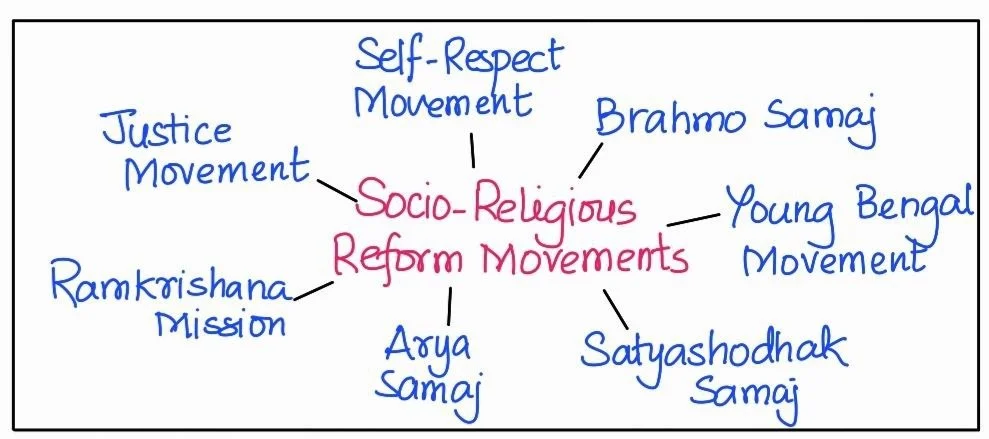![]() 25 Jun 2024
25 Jun 2024
Socio-religious reform movements in India, spanning the 19th and early 20th centuries, aimed at challenging entrenched social norms and religious practices. Led by influential figures like Raja Ram Mohan Roy, Swami Vivekananda, and Sayyid Ahmed Khan, these movements advocated for social equality, education, and rationalism amidst diverse religious communities.
Origins and Founding: Founded in 1830 by Raja Ram Mohan Roy and Dwarkanath Tagore in Calcutta, the Brahmo Samaj emerged as a response to the social and religious challenges of the time.

Radical Ideas: Henry Louis Vivian Derozio, a teacher at Hindu College, Calcutta, in the 1820s, promoted radical ideas and encouraged his pupils to question all authority.
Salvation through Service: Named after Ramakrishna Paramhansa, Swami Vivekananda’s guru, the Ramakrishna Mission stressed the ideal of salvation through social service and selfless action.
Social Reform Movement: Established in 1867 at Bombay, the Prarthana Samaj sought to remove caste restrictions, abolish child marriage, encourage the education of women, and end the ban on widow remarriage.
Brahmo Influence: Established in 1864 in Madras (Chennai), was inspired by the Brahmo Samaj.
Sikh Reform Movement: Reform organisations of the Sikhs, the first Singh Sabhas were formed at Amritsar in 1873 and at Lahore in 1879.
| Must Read | |
| Current Affairs | Editorial Analysis |
| Upsc Notes | Upsc Blogs |
| NCERT Notes | Free Main Answer Writing |
Struggle for Equality: Apart from this leaders from lower castes also criticised caste prejudice by forceful speeches, writings and various movements to fight for their dignity and to achieve equal status in the society.
| Related Articles | |
| SOCIO-RELIGIOUS REFORM MOVEMENT | RAJA RAM MOHAN ROY |
| Swami Vivekananda: Biography, Early Life and National Youth Day | BRAHMO SAMAJ |
<div class="new-fform">
</div>